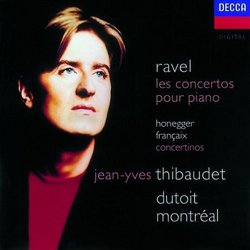SUPERB RAVEL BY THIBAUDET & DUTOIT
MOVIE MAVEN | New York, NY USA | 12/24/2000
(5 out of 5 stars)
"It couldn't hurt that the two men really responsible for the music making on this CD of French concertos are actually French! Ravel's "Concerto in G major" is on my very short list of favorite pieces of music and I have several first rate performances on disc: de Larrocha and Argerich are certainly stand outs. But I truly believe that this is the disc to own if you can only buy one. Thibaudet's playing is a wonder: just the perfect combination of excitement and fluidity and grace--mixed with Ravel's sense of 20th century jazz. (Thibaudet's jazz disc of arrangements for piano of songs by Duke Ellington is also a marvel.) The Orchestre Symphonique de Montreal under Charles Dutoit sounds great on this London 1996 disc. And as an added enticement, Thibaudet has recorded two rarities as companion pieces to the two Ravel concertos: Honegger's "Concertino" and Francaix's "Concertino.""
Sentimental Reviewer--Tired Performances
C. Pontus T. | SE/Asia | 08/30/2008
(2 out of 5 stars)
"Writing this review puts me in a sentimental mood. In my teenage years, Thibaudet almost became like an idol. Thus, I got this CD straight after its release back in 1996. What makes me sentimental is the fact that, although having been played at least 50 times, it seldom ends up in my CD player nowadays. If not for the Honegger and Francaix fillers, it probably wouldn't even be on my shelf any longer.
'These are particularly opulent accounts of the music' and 'London's engineering captures the orchestra t o perfection' is what Ted Libbey has to say in the editorial review. Could there perhaps have been a mix-up with another recording? If not, Mr Libbey may have been as tired when writing his review as Thibaudet and Dutoit when recording this disc. Indeed, I doubt whether there are any more lackluster, unimaginative and indifferent versions of the Ravel Concertos in the current catalogue.
In both Concertos, Ravel serves the pianist as well as conductor with an endless array of masterful musical details--like an infinite box of chocolates. What the Thibaudet/Dutoit/Decca partnership truly excels at is hiding most of them in rigid, generalised and murky renditions of two of the most colourful and exuberant concertos in the repertoire. Just try Dutoit's uncommonly tame take on the auspicious opening of the D-major Concerto, Thibaudet's completely anemic closing left-hand cadenza in the same; Dutoit's heartless conducting of that magical transition to the first movement's cadenza in the G-major Concerto, or Thibaudet's total unawareness of the fact that its second movement is made up of one of the most delicate melodies of the 20th century.
Sad though it is, I have to confess that the years have left Thibaudet's Ravel Concertos with only one star. As already mentioned, the Honegger and Francaix fillers fare somewhat better, warranting a second star. The ill-balanced and unatmospheric recorded sound--far below what Decca routinely achieves in St. Eustache--provides no further help. Tired too by now? Luckily, there are several multiple times better alternatives to make you sit up, smile and stamp your feet through Ravel's swinging Concertos--Zimerman, Lortie or a homemade killer combination of Argerich in G and Gavrilov in D."
Finely Detailed French Music
B. R. Merrick | 08/03/2008
(4 out of 5 stars)
"Thibaudet brings color and a light precision to Ravel's Concerto in G, along with the Honegger and Françaix. Dutoit and his orchestra accompany perfectly. For these three pieces alone I highly recommend this CD.
The Concerto for the Left Hand, however, while also expertly played, is lacking. This is due to the fact that it is played in the same manner as the other three lighter works. Indeed, this is all French music, known for its expression through ornamentation and flirtations with jazz. But one of the most interesting things about the Concerto for the Left Hand is the fact that Ravel wrote both piano concertos at the same time, yet they contrast one another in every respect.
Given the circumstances surrounding the commissioning of this concerto, its warlike romanticism, bordering on the brink of terror in parts, should have been brought out much more. Thibaudet, and even Dutoit, seem more content to focus on the incredible amount of particulars with which five fingers need ever be concerned. It's impressive for its virtuosity, but it's missing the point of the music, in my opinion.
If, however, you would rather focus on this concerto's French character and less on its philosophical implications, I say go for it. This is wonderful playing."


 Track Listings (10) - Disc #1
Track Listings (10) - Disc #1